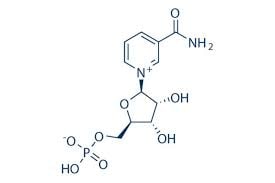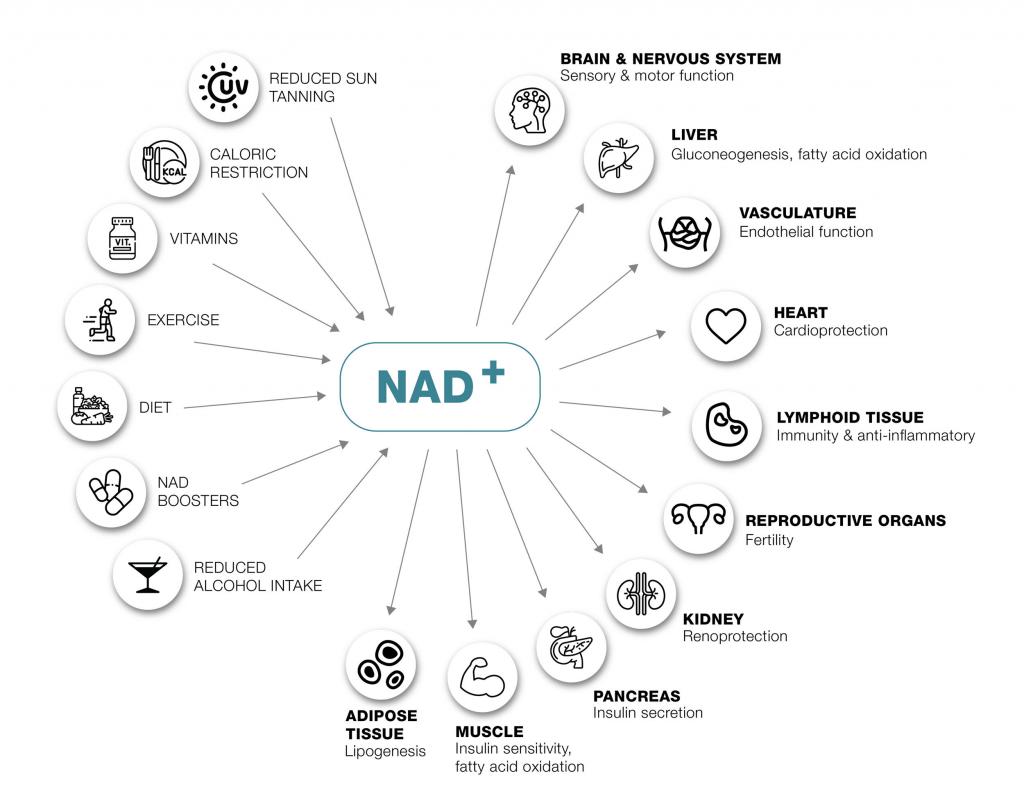The essential molecule nicotinamide adenine dinucleotide (NAD+) plays crucial roles in cellular reactions that generate energy, repair DNA, and counter cell stress. Studies show that NAD+ levels fall as we grow older, which likely leads to age-associated diseases such as neurodegenerative, cardiovascular, and metabolic conditions. To maintain cell NAD+ concentrations and prevent age-related ailments, researchers have developed methods to increase NAD+.
Increasing NAD+ with Its Precursors
One of the most proficient ways to increase NAD+ encompasses supplementing with NAD+ precursors, including nicotinamide mononucleotide (NMN) and nicotinamide riboside (NR). Those who take NMN typically use doses between 250 mg and 500 mg per day. Adults of average weight (about 60 kg) usually safely take 180 mg of NR per day. To date, no direct comparisons of NMN’s and NR’s capabilities to raise NAD+ in the blood or other organs have been conducted. However, since NMN is the immediate precursor to NAD+, the possibility remains that NMN increases NAD+ levels more efficiently.

Researchers have identified an NMN transporter (Slc12a8) in the intestines of mice, which may facilitate a more direct route for NMN to gain access to the bloodstream. If this transporter provides a more direct route for NMN absorption, this may lend further support to NMN more efficiently increasing NAD+ levels compared to NR.
Consuming Resveratrol or Foods with Fructose Increases NAD+
Resveratrol, a type of plant compound called a polyphenol, also increases NAD+ levels. It does so by increasing the activity of an enzyme that converts NMN to NAD+ called nicotinamide mononucleotide adenylyltransferase (NMNAT). Moreover, resveratrol serves as an antioxidant to mitigate inflammation and protect against cancer and cardiovascular disease.
Interestingly, consuming foods with the sugar fructose, such as apples, peas, zucchini, grapes, and asparagus, has been shown to possibly increase NAD+ levels. Researchers have deduced that eating these foods increases the activity of the pro-longevity protein sirtuin 1, which uses NAD+ to function. In animal models, sirtuin 1 activation has been linked to extended lifespans.
Utilizing Caloric Restriction and Exercise to Boost NAD+ Levels
Other methods to increase NAD+ levels include reducing caloric intake and exercise. Rodent studies have demonstrated that calorie restriction — reducing daily caloric intake without malnutrition — increases blood NAD+ levels and extends lifespan. There are multiple calorie restriction regimens, including intermittent fasting, which is going longer than a day without eating and time-restricted feeding, which involves not eating for 16 hours within 24 hours. Strict regimens like these can be difficult to follow for many individuals, so as an alternative, some have turned to the fasting-mimicking diet, a diet involving reduced consumption of branched-chain amino acids.
In addition to caloric restriction, exercise can reverse the age-related decline of NAD+ levels. Exercise also comes along with a plethora of other health-benefits that promote longevity, such as improving brain and cardiovascular health. For this reason, exercise may be one of the best natural anti-aging elixirs.
Limiting Alcohol Consumption and Sun Exposure to Maintain NAD+ Levels
Cutting out alcohol consumption may offer a way to mitigate age-related NAD+ reductions. Alcohol consumption increases the ratio of NAD+ with added electrons (NADH) to free NAD+. This scenario inhibits NAD+’s capacity to activate cell and DNA health-maintaining proteins called sirtuins along with impeding cell energy-producing reactions. Limiting sun exposure is another way to preserve NAD+ levels. Studies have shown that sun exposure consumes NAD+ in the skin, limiting the skin’s ability to counteract inflammation and conferring a higher probability of skin cancer.
Increasing NAD+ Levels to Enhance the Years We Live

From exercise and dietary interventions to supplementing with NAD+ precursors, researchers have discovered numerous ways to increase NAD+ as we grow older. Pharmaceutical approaches may provide the most promising methods to increase NAD+, though. For example, a recent study has shown that supplementing with the precursor NMN increases NAD+ levels by about 20% in the blood in the first hour after administration. New pharmaceuticals that inhibit NAD+’s degradation by NAD+-consuming enzymes have been identified recently that increase NAD+ levels in rodents. Along these lines, finding ways to boost NAD+, whether natural or pharmaceutical, has become a hot topic in anti-aging research. As research progresses, we may witness the development of drugs that prevent age-related diseases which depend on increasing NAD+ levels. Such developments may extend lifespan and increase the number of healthy years we live.